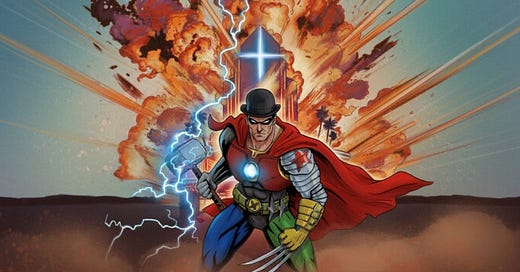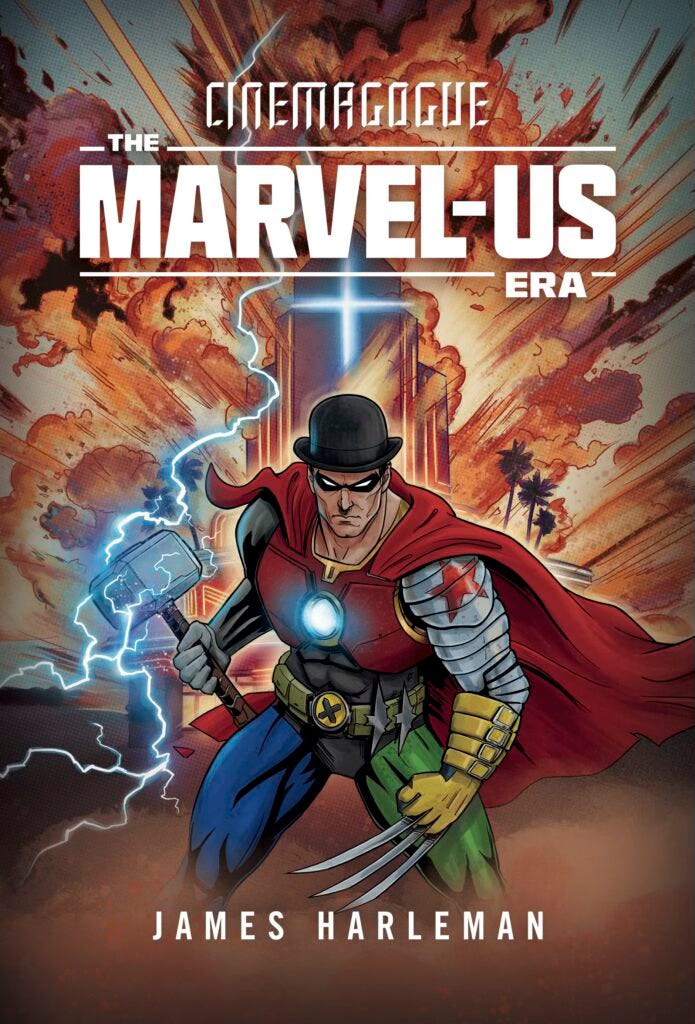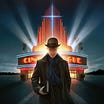“I can do this all day…” - Steve Rogers, Captain America (2011)
…or maybe he should have said “decade”.
It’s not speculative to say that the 2010s, cinematically speaking, will always be remembered as the film era fueled and dominated by Marvel. No matter where this still-unparalleled cinematic universe goes, or how it fares in years to come, it monopolized this decade with an unprecedented experiment that paid off beyond expectations, spawning much imitation and changing the landscape of moviemaking… and perhaps mythmaking.
Quickly climbing to become one of the highest grossing movie franchises of all time with 32 billion and counting, and claiming the coveted “highest grossing film of all time” slot with Avengers: Endgame, (until Avatar’s rerelease snuck Cameron’s epic back on top) it's clear that—overall—the first three “phases” of Marvel films have been embraced and beloved by the majority of the world. Now, one might try to dismiss this triumph as the flash and bang of noisy, “mindless” crowd-pleasing blockbusters and negate anything deeper at work here. Indeed, even great filmmakers like Martin Scorsese have disparaged this genre, saying that superheroes aren't even true cinema.
“Honestly,” he opined, “the closest I can think of them—as well made as they are, with actors doing the best they can under the circumstances—is theme parks.”
First of all, theme parks are awesome, so… not even a criticism! But even if Scorsese is right about certain film entries, it isn't fair to lump a whole cinematic universe, or superhero genre, into one dismissive lump when that “lump” includes directors like Jon Favreau, Kenneth Branagh, Joss Whedon, James Gunn, Ryan Coogler, the Russo Brothers, etc. (and Scorsese pilloried the whole genre, which means he's throwing in Christopher Nolan, Matt Reeves, James Mangold, Richard Donner and more). But that’s not the main issue here: fans of my work with Cinemagogue (including Family Movie Night’s own John Perritt) know better than to dismiss any genre as mindless, and I elaborated at length in that first book just what this style of modern myth-making mimics, what Joseph Campbell elaborates on in terms of “monomyth” in his book The Hero with a Thousand Faces. I don’t like to quibble with creatives like Scorsese or Tarantino, but it seems as though—if Homer had lived and created today—they’d write off his Iliad and Odyssey as the stuff of theme parks. Hey kids, get ready for the Scylla and Charybdis coaster!
This kind of heroic fantasy epic in modern culture mirrors Greco-Roman myths that captivated people in their age, as well as the same sword-wielding and planetary romance heroes that left radio listeners spellbound in the early 20th century. Larger than life, fantastical heroes have garnered an audience in every era, and part of that is because it's tapping into more than myth: it's scratching the itch of the felt “meganarrative” in which we all share a part (whether we believe it or not). This is another reason the Marvel Cinematic saga deserves a look, because creative director Kevin Feige and his team bravely grappled with the concept of “meganarrative” on a level that hadn’t been attempted with film. Instead of separate franchises, each with their own character’s metanarrative, they tried—and succeeded—to make Marvel next level, to weave what would have traditionally been individual franchises into one grand story, in which all the characters play a part. What they attempted is beyond traditional, it's practically biblical.
Seriously, Christians enjoy God’s true meganarrative contained in 66 books by around 40 different authors spanning 1,500 years. Each author also brings their own unique literary style and tone, but they all weave together (by one guiding Spirit) to illuminate one story with many players, revealing a central character and monumental climax. By this standard, Phases One to Three of the MCU—the “Infinity Saga”— seem much lesser. But hey, let’s give credit where credit is due: weaving together 23 films by 14 different directors across 11 years (with one guiding guru) is nothing to sneeze at, and most of these entries were undisputed hits. Also, like the Bible, each story—and the overarching story—is filled with mindful moments for understanding and life application.
In my new book Cinemagogue: The MARVEL-Us Era we journey from Iron Man to his Endgame,highlighting the major themes and biblical parallels of each film along this well-traveled road. I also cherry-pick a few films that have followed as we ponder where the shared universe is headed now, as well as covering some other franchise favorites. My hope is that households use this as a multimedia adventure for Family Movie Nights, revisiting each movie and engaging its entry in the book to foster thoughtful discussion, to see how the Marvel metanarrative measures up to the meganarrative that Christians love the most.
“Before all your people I will do MARVELS, such as have not been created in all the earth or in any nation. And all the people among whom you are shall see the work of the Lord, for it is an awesome thing that I will do with you.” - God, Exodus 34:10
Fire up the boot jets and let’s do a fly-by together, shall we?
“…suit up… I’m bringing the party to you.” - Tony Stark, The Avengers (2012)
Cinemagogue: The MARVEL-Us Era is available on Amazon in Hardcover, Paperback and Kindle edition.
James Harleman has written and taught on film and theology for over two decades at conferences, churches, schools and through his website, Cinemagogue. He co-hosts the popular film and faith podcast "Popcorn Theology". As an ordained minister, James travels and lectures on cinema and spirituality, as well as speaking and teaching on a wide variety of cultural and theological topics. He's contributed articles and reviews to The Resurgence, Reel World Theology, Hollywood Jesus and Collide Magazine. (He also made the Kessel Run in less than eleven parsecs.) James enjoys watching movies with his cinephile wife Kathryn who shares his passion for cosplay, karaoke, sci-fi, horror movies, and comic books. They're presently working to publish several short stories and a series of novels. He is also part of the Rebel Alliance and a traitor. Take him away.






